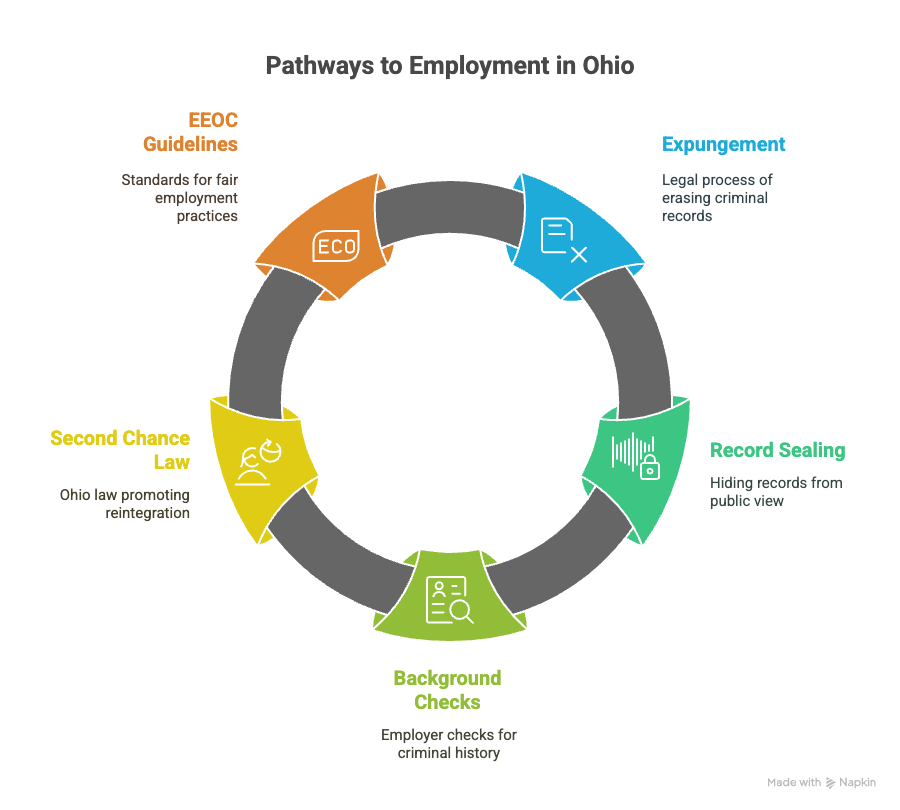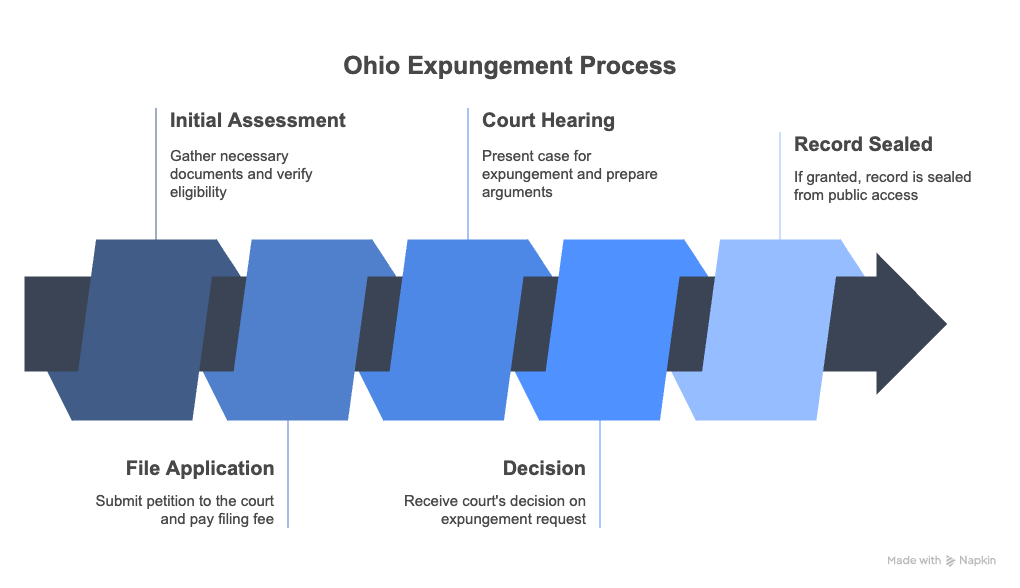Navigating the job market can be challenging, especially with a criminal record hanging over your head. Fortunately, Ohio's new expungement law offers a lifeline to those looking to make a fresh start. The "Second Chance" sealing law provides a pathway for eligible individuals to clean up their criminal records, significantly boosting their employment prospects and allowing them to move forward in life with confidence.
Key Takeaways
- Ohio's "Second Chance" law helps individuals with criminal records improve their job prospects by allowing them to seal their records.
- Sealing a record can prevent it from appearing in employer background checks, which can lead to better job opportunities.
- Eligible individuals are primarily those with misdemeanors or non-violent felonies; violent and certain sexual offenses cannot be sealed.
- The expungement process involves assembling documentation, filing a petition, attending a court hearing, and possibly paying a fee.
- Research from the University of Michigan demonstrates that expungement increases wages by an average of 23% within one year, while employment likelihood rises by 11%.
Introduction
Ohio's new expungement law, known as the "Second Chance" sealing law, offers a critical path for individuals with criminal records to improve their job prospects. This law allows eligible people to have their criminal records sealed, effectively giving them a new start. By clearing past legal mistakes from public view, it removes barriers to employment.
The benefits are significant. Sealing a record can dramatically improve your chances of landing a job. Employers often use background checks as part of their hiring process, and a sealed record will not appear in these searches. This means you won't be automatically disqualified because of past convictions.
For job seekers with a criminal history, expungement reduces stigma, opening doors to positions previously out of reach. It encourages a fair hiring process, leveling the playing field so you can be judged on your merits rather than your past.
This guide will help you navigate Ohio's expungement law. It aims to break down its complexities and demonstrate how you can use it to your advantage. You'll find actionable insights focused on boosting your employment prospects and guiding you through each step of the expungement process.
Understanding Ohio Expungement and Employment
Expungement and record sealing might sound like legal jargon, but their impact is straightforward. Expungement refers to the legal process of erasing a criminal conviction from state or federal records, while record sealing hides it from public view, though it can still be accessed by law enforcement. In Ohio, these processes offer a real chance at employment for those burdened by past mistakes.

When you apply for a job, employers often run background checks. An expunged or sealed record won't show up in these checks, giving you a clean slate. This changes the game in applications and interviews. With a blank sheet, you're judged solely on your current abilities, not past errors.
Ohio's "Second Chance" law is designed to broaden these opportunities. It aims to clear pathways for individuals to reintegrate into society through employment, which can be a cornerstone for personal stability and success.
To fully grasp your rights, familiarize yourself with background check practices, including EEOC guidelines. These resources will help you understand how employers use background information and ways to address your history transparently, if necessary. With the right approach, you can navigate job markets more effectively despite past challenges.
Second Chance Law Ohio: An Overview
Ohio's Second Chance Law is a significant reform aimed at improving the prospects for individuals with criminal records. This law was implemented to give people a fair shot at employment, recognizing that past mistakes should not permanently block future opportunities. It allows those with certain convictions to seal their records, essentially offering a new beginning.
The law specifically targets individuals with criminal records who are seeking employment. It focuses on misdemeanors and low-level felonies. By sealing these records, the law helps reduce the stigma that often hinders job applications. It is a powerful tool for those who have met specific criteria and demonstrated rehabilitation.
Historically, expungement laws in Ohio have evolved to address the growing recognition of social and economic barriers faced by individuals with criminal histories. This reform is part of ongoing efforts to balance the safety concerns of communities with the need for rehabilitation and integration of past offenders into society. Records indicate a marked increase in successful job placements as a result of these progressive measures. The Second Chance Law is an essential development, widening the path to self-sufficiency and stability for many Ohioans.
Expungement Eligibility Ohio
Understanding whether you qualify for expungement is the first step in making the most of Ohio's "Second Chance" law. Eligibility depends on several factors, primarily the nature of your conviction and the time that's passed.
Eligibility Criteria
To qualify for expungement, Ohio law requires that you meet specific criteria. Generally, individuals with misdemeanors or non-violent felonies are eligible. The law also considers factors like the number of offenses and time elapsed since the conviction or completion of your sentence. For example, if you have one felony and it's been at least three years since your sentence ended, you may qualify. Similarly, if you have misdemeanors, you might need to wait one year post-sentence completion.
Exclusions
Not all offenses are eligible for expungement. Crimes involving violence, certain sexual offenses, and other specific felonies remain on your record. This reflects the state's interest in maintaining public safety. It’s crucial to understand these limitations, as applying for expungement of ineligible offenses wastes time and resources.
Case-by-Case Determination
Assessing eligibility can be complex, and not every situation is clear-cut. It's wise to consult with an attorney who understands the nuances of Ohio law. Legal counsel can evaluate your unique circumstances and guide you through the application process. Each case presents distinct details that can affect the outcome, and professional advice ensures you address these nuances appropriately.
Do you qualify for expungement? Is your case more complicated than it seems? Spending time with a legal expert might provide the answers you need to move forward with confidence.
The Expungement Process in Ohio
Navigating Ohio's expungement process involves several critical steps. Your journey begins with an initial assessment. Gather all necessary documentation and verify your eligibility. Start by collecting court documents related to your conviction, such as the complaint, final disposition, and any evidence of fulfilling your sentence, like proof of paying fines or completing community service.
Once you're certain about eligibility, it's time to file the application. This step typically involves submitting a petition to the court where your conviction occurred. Be prepared to pay a filing fee, which can vary by county. If financial constraints are an issue, inquire about fee waivers.
Next comes the court hearing. The court will schedule a hearing to consider your expungement request. This is your chance to make a case for why the court should grant your expungement. Prepare by understanding what the judge will consider, such as the nature of your offense, your behavior since the conviction, and the benefits of expungement. Having legal representation or a statement from an attorney could be invaluable here.
Finally, the decision arrives. If the court grants your expungement, your record will be sealed, meaning most employers and the public won't have access. However, some government agencies might still see it. If denied, ask for the reasons and consider consulting legal counsel to explore possible appeals or reapplications.

Each step in this process is crucial for clearing your record and improving job prospects. Staying organized, prepared, and informed can make a significant difference in the outcome.
Ohio Record Sealing and Employment Opportunities
Record sealing can significantly affect your employment prospects by altering what's visible to potential employers during background checks. When a record is sealed, it won't appear in most public or employer-requested searches, granting you a cleaner slate to work from. This can be particularly beneficial during the job application process, as many employers overlook candidates with criminal records.
For example, a study by the University of Michigan found that those who had records expunged saw a 22-23% increase in wages within a year. This shows that a sealed record not only improves your chances of getting a job but can also positively impact your career growth and salary.
Beyond practical benefits, sealing your record can also change how you're perceived. Without the shadow of a criminal record, stigma diminishes, allowing you to engage with employers on equal footing. This shift can help restore your reputation, giving you the same opportunity to prove your skills and experience as anyone else. Facing interviews without the burden of explaining past transgressions can lead you to new roles that were previously out of reach.
Have you considered how removing barriers like a visible criminal record might change your path? Sealing your record might be the first step to reclaiming control over your career trajectory.
Practical Tips for Ohio Job Seekers
When facing the job market after sealing your record, preparation is vital. Start by organizing your documents. Gather any paperwork related to your expungement and any court documents that verify your newly sealed record. Legal assistance isn't just helpful—it's often necessary. An attorney can guide you through the documentation process and ensure you're making informed decisions.
Be ready for interviews. Even with a sealed record, you might still be asked about past legal troubles. Practice answering these questions with honesty and brevity. A simple acknowledgment of past mistakes and a focus on growth can be effective. Highlight what you’ve learned and how you've prepared yourself for new opportunities.
Understanding your rights post-expungement is crucial. You are no longer required to disclose sealed offenses in most job applications. Familiarize yourself with the exceptions, and ensure you're ready to assert your rights if questioned inappropriately.
Finally, focus on rebuilding. Consider educational opportunities or training programs to bolster your skills and resume. Networking can also be valuable. Seek out job fairs and community events where you can connect with potential employers. By staying informed and proactive, you position yourself to seize the chances Ohio's Second Chance law affords.
Conclusion
Ohio's expungement law is transformative for individuals with criminal records seeking fresh starts. It can significantly change lives, impacting individuals and communities positively. When records are sealed, they no longer pose barriers. This means job seekers often meet opportunities with less bias from employers.
When your record is clean, employers focus more on your skills and experience. This shifts the hiring process from evaluating past mistakes to recognizing present potential. The "Second Chance" law supports a more equitable job market by leveling the playing field.
While legal processes can be complex, they are worth navigating. A fresh start is within reach for many, supported by legal frameworks aiming to embrace second chances. Embracing this possibility is crucial. By pursuing expungement, you can regain control over your narrative.
For those impacted by past mistakes, Ohio’s expungement law offers hope. It invites one to step into roles previously out of reach. Access to better employment opportunities leads to fulfilling careers and stronger contributions to local economies.
Resources and support systems are available to help you navigate this journey. Engage with legal aid organizations or consult reliable online sources to learn more about the process. The path may have its challenges, but the potential rewards can reshape your future.
Frequently Asked Questions (FAQs)
How long does expungement take in Ohio?
The expungement process typically takes between three to six months once the application is filed. This duration may vary based on the complexity of your case and court schedules.
Can employers see expunged records in Ohio?
No, employers cannot see expunged records. Once a record is expunged, it is removed from public access and treated as if it never existed.
What crimes are ineligible for expungement in Ohio?
Certain crimes like rape, murder, and other violent felonies, as well as most sexual offenses, are ineligible for expungement in Ohio. Here's a list of ineligible offenses:
- First/second-degree felonies.
- Three or more third-degree felonies.
- Domestic violence convictions (even fourth-degree misdemeanors).
- Offenses with victims under 13 (excluding non-support cases).
- Traffic violations and most sexually oriented offenses
How much does it cost to seal a record in Ohio?
The cost to seal a record can vary, but generally, there is a filing fee of about $50. Additional legal fees apply if you hire an attorney.
Does Ohio allow expungement for violent felonies?
No, Ohio does not allow the expungement of most violent felonies, including serious offenses like murder and rape.
Can you expunge a DUI in Ohio?
DUIs (OVIs) are not eligible for expungement in Ohio. They stay on your record permanently.
How to check if your Ohio record is sealed?
You can check the status of your record by contacting the clerk of courts in the county where the record was filed, or by seeking assistance from an attorney.
Do employers have to ignore sealed records in Ohio?
Yes, employers typically must treat sealed records as nonexistent when conducting background checks for employment.
Can expunged records affect professional licenses in Ohio?
In Ohio, expunged records should not affect professional licenses, but certain licensing boards may have specific rules. It's best to verify with your licensing board.
Does Ohio expunge juvenile records automatically?
While juvenile records are not immediately expunged, Ohio law requires automatic expungement of sealed juvenile records five years after sealing or when the individual turns 25, whichever comes first.
Is public access to sealed records allowed in Ohio?
No, sealed records are not accessible to the public and are treated as confidential.
How can I find a lawyer for expungement in Ohio?
You can find a lawyer by contacting your local bar association for referrals or by conducting an online search for attorneys specializing in expungement.
What is the difference between sealing and expunging a record in Ohio?
Sealing a record means it is hidden from public view but still exists. Expunging a record means it is completely removed and treated as if it never happened.
Can sealed records be reopened in Ohio?
In rare cases, sealed records can be reopened by court order, typically only under specific circumstances like new evidence or legal errors.
Definitions
Expungement
Expungement is a legal process that removes a criminal conviction from state or federal records. It erases the offense as if it never occurred, in the eyes of the law. If your record is expunged, most employers won’t be able to see it during background checks. This can open up more job opportunities and help you avoid being automatically disqualified.
Record Sealing
Record sealing means that your criminal record is hidden from the general public but still available to law enforcement and some government agencies. Employers typically won’t see sealed records during standard background checks. This allows you to apply for jobs with greater confidence and focus on your skills, not your past.
Background Check
A background check is a common part of the hiring process where employers review criminal history, employment history, and other personal details. A clean check can improve your chances of getting hired. If your record is sealed or expunged, past offenses usually won't appear, giving you a fairer shot at the job.
Fair Hiring Process
A fair hiring process means evaluating job applicants based on their qualifications and abilities, not just their past. When records are sealed or expunged, employers can assess candidates without bias. This approach helps you compete on equal terms with others applying for the same role.
Job Prospect
A job prospect is any potential or future opportunity for employment. If your criminal record is cleared or hidden through expungement or sealing, your job prospects improve. Employers are more likely to consider you for roles when your history doesn’t raise red flags. A better record can mean more interviews and stronger chances of an offer.
References
Still have questions?
Get in touch with our team today for a personalized demo and discover how our tailored volume pricing and packages can drive results for your business!
How useful was this page?*
Note: your comments are anonymous. We use them to improve the website. Do not include any personal details.
Visit our FCRA Compliance Tool or leave a message here if you need a response.
From the blog Explore the GCheck Content Hub

Employment Credit Checks: 2026 Guide to Legal Compliance and Best Practices
7 Jan, 2026 • 27 min read
I-9 Form Management Systems: Modernizing Employment Eligibility Verification for 2026
6 Jan, 2026 • 19 min read
EEOC Compliance Requirements 2026: Complete Employer Guide to Fair Hiring Practices
29 Dec, 2025 • 24 min readThe information provided in this article is for general informational and educational purposes only and should not be construed as legal advice or a substitute for consultation with qualified legal counsel. While we strive to ensure accuracy, employment screening laws and regulations—including but not limited to the Fair Credit Reporting Act (FCRA), Equal Employment Opportunity Commission (EEOC) guidelines, state and local ban-the-box laws, industry-specific requirements, and other applicable federal, state, and local statutes—are subject to frequent changes, varying interpretations, and jurisdiction-specific applications that may affect their implementation in your organization. Employers and screening decision-makers are solely responsible for ensuring their background check policies, procedures, and practices comply with all applicable laws and regulations relevant to their specific industry, location, and circumstances. We strongly recommend consulting with qualified employment law attorneys and compliance professionals before making hiring, tenant screening, or other decisions based on background check information.

